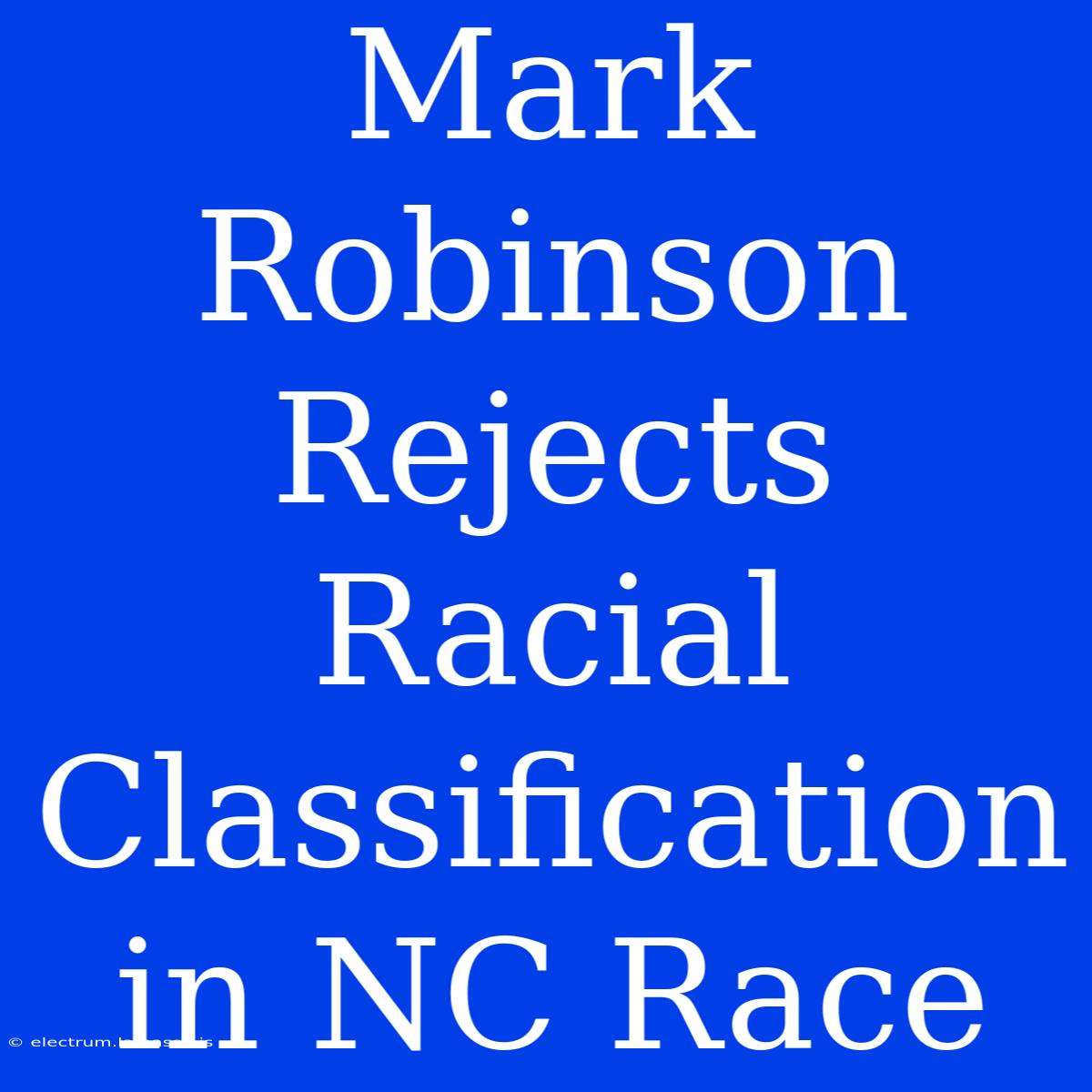Mark Robinson Rejects Racial Classification in NC Race: A Deep Dive into the Controversy
Is racial classification a valid tool in modern politics? Mark Robinson's rejection of it in the North Carolina gubernatorial race has ignited a heated debate. Editor Note: The North Carolina gubernatorial race has become a focal point for the discussion of racial classification in American politics. Robinson's stance, while controversial, is raising important questions about the role of race in contemporary political discourse.
This debate is significant because it underscores the complex interplay between race, identity, and political strategy. While some argue that racial classification is necessary to address historical injustices and promote inclusivity, others believe it exacerbates divisions and undermines the ideal of color-blindness.
Our analysis delves into the various arguments surrounding Mark Robinson's rejection of racial classification. We aim to present a comprehensive overview of the issue, examining the historical context, the political implications, and the potential consequences of this stance.
Key Takeaways:
| Key Aspect | Description |
|---|---|
| Historical Context | Understanding the legacy of race and racism in the US is crucial. |
| Political Implications | Robinson's stance impacts voter demographics and political strategies. |
| Consequences | The debate raises questions about identity, equity, and social cohesion. |
Mark Robinson and Racial Classification:
The controversy surrounding Mark Robinson's rejection of racial classification revolves around his belief that focusing on race is divisive and unproductive. He argues that voters should be judged based on their individual merits, not their race.
Historical Context:
The issue of racial classification in American politics is deeply rooted in history. From the era of slavery to the civil rights movement, racial categories have been used to define and segregate people. This history continues to impact the present, shaping perceptions and influencing political strategies.
Political Implications:
Robinson's rejection of racial classification has significant political implications. It positions him as a candidate who appeals to voters who are wary of identity politics and who believe in individual meritocracy. However, it also risks alienating minority voters who see racial classification as a necessary tool for addressing systemic inequities.
Consequences:
The debate over racial classification has broader consequences for American society. It raises questions about the role of race in political discourse, the definition of identity, and the pursuit of equity. It also highlights the challenges of fostering a society where people are judged by their character, not their race.
The Future of Racial Classification:
The debate over racial classification is likely to continue in the coming years. It is a complex issue with no easy answers. As society continues to evolve, the role of race in politics will need to be carefully considered and debated.
FAQ:
Q: What are the arguments in favor of racial classification?
A: Supporters of racial classification argue that it is necessary to address historical injustices and promote inclusivity. They believe that recognizing racial categories is essential for understanding and dismantling systemic racism.
Q: What are the arguments against racial classification?
A: Critics of racial classification argue that it exacerbates divisions and undermines the ideal of color-blindness. They believe that focusing on race perpetuates a sense of separation and prevents people from being judged based on their individual merits.
Q: Is Mark Robinson's rejection of racial classification a sign of a broader shift in American politics?
A: It is too early to say whether Robinson's rejection of racial classification is a sign of a broader shift in American politics. However, it is a reflection of the growing tension between those who believe in individual meritocracy and those who believe that systemic inequalities must be addressed.
Tips for Navigating the Debate:
- Understand the historical context: The debate over racial classification is rooted in centuries of history.
- Listen to different perspectives: There are valid arguments on both sides of this issue.
- Focus on solutions: Rather than simply debating the merits of racial classification, look for solutions that address the underlying challenges of racial inequality.
- Engage in respectful dialogue: It is important to engage in respectful dialogue with those who hold different views.
In Conclusion:
The debate over racial classification is a complex and sensitive one. Mark Robinson's rejection of it in the North Carolina gubernatorial race highlights the evolving role of race in American politics. By understanding the historical context, the political implications, and the potential consequences of this debate, we can move towards a more inclusive and equitable future.

